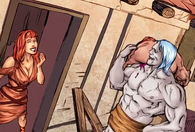| Karina | ||
|---|---|---|

| ||
| First appearance | Comic #4: The Shadow of Death | |
| Last appearance | Comic #4: The Shadow of Death | |
| Profession | Farmer's daughter | |
| Race | Greek | |
| Relationships | Theokoles (Lover, deceased) | |
| Status | Deceased (Killed by Theokoles) | |
| Actor/Actress | N/A | |
Karina is a Greek who lived in the village of Laconia near Theokoles' farm when he was younger.
Appearance[]
Karina has a slim build and shoulder-length red hair. She is seen wearing a pink (almost mason) dress.
Personality[]
Karina has a soft and compassionate heart, as although everyone else in her town showed Theokoles with disdain, she showed him kindness and even developed feelings for him.
The Shadow of Death[]

Karina and Theokoles as friends.
After Theokoles' Mother's death, Theokoles seldom left his farm to visit town. When he did go, the only one to ever show him kindness was Karina. Theokoles' mother had taught him to return such treatment in kind and thus, they became close. Karina was his only respite from his loneliness. Soon, the two became lovers.

Karina and Theokoles making love.
During their lovemaking, Theokoles become too much for her, and unintentionally kills her. After her death, Theokoles is attacked by the townsfolk, who see him as a monster. After killing those who attack him, Theokoles buries Karina next to his mother and leaves the village, having lost the second and last person who cared for him.
Trivia[]
- It is unclear exactly what killed her during her sexual intercourse with Theokoles. Its likely that he didn't know his own strength and she didn't, or was unable to tell him to stop and her heart couldn't keep up with the strain.
- Her grave is never shown, its simply stated that he buried her and left Laconia.
- Laconia (or Lacedaemonia) is the name of the southernmost region in Greece, the same where the former city-state and regional power of Sparta is located.
- The name Karina may derive from the Latin 'carus' which means "dear", "beloved". Or it could indicate the origin of the Caria, Anatolia region.